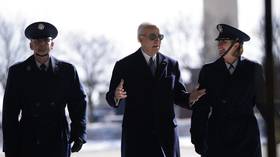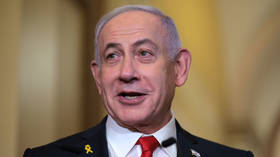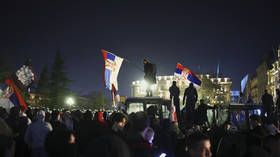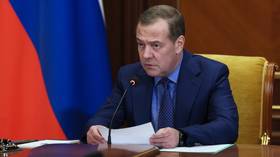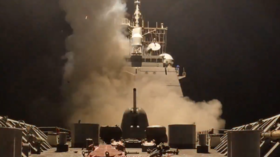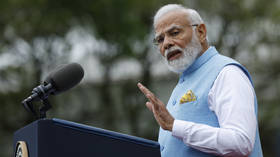NATO knocking, but should Russia answer the door?

The Western military bloc will announce its new global strategy at a summit in Lisbon, Portugal, next week, while also considering its relationship with former nemesis Russia.
In a final push before next week’s historic meeting, NATO’s 300-member Parliamentary Assembly is meeting in Warsaw Friday for a final round of discussions on Afghanistan, the future global vision of the military bloc and, finally, a NATO-Russian partnership.For most of NATO’s 61-year existence, Russia was either entertained as a flat-out enemy, or the equivalent of a middle-aged guy who surprisingly accepts an invitation to the wedding reception of his former spouse. Yes, a bit uncomfortable and even surreal.Given the rise of brand-new global challenges, however, which are bursting the seams of Western budgets and troop limits, Russia is now viewed in many quarters as a partner that NATO can no longer afford to ignore.The first task of NATO’s Lisbon Summit (Nov. 19-20), however, will be to formally announce the 28-nation military bloc’s strategic vision for the future, which was carried out by former US secretary of state Madeleine Albright and her counsel of “wise men.” The last time NATO conducted such an introspective examination of itself was 11 years ago. Meanwhile, NATO’s revamped mission statement comes after Russia advanced its own vision of global security that would protect “from Vancouver to Vladivostok.”Last month, Russian President Dmitry Medvedev provided further details of his security plan (first mentioned in April, 2009) in Deauville, France, where he met French President Nicolas Sarkozy and German Chancellor Angela Merkel for two-day talks on European security. It was during these talks that Medvedev accepted an invitation to attend the upcoming NATO Summit in Lisbon.As expected, Russia’s foray into the debate on European security prompted no small amount of hand wringing in Washington, which has long viewed itself as the righteous benefactor and protector of the European landmass. “When Moscow unveiled the text of its proposed legally binding treaty in November 2009, much of it was familiar and agreeable: respect for members’ territorial integrity, conflict prevention, and the inadmissibility of the use and threat of force,” wrote Sally McNamara in a paper for the right-leaning, US-based Heritage Foundation. McNamara goes on to argue, however, that “the details of Russia’s proposals… would likely make Moscow an even more problematic partner for the West than it is at present. “The European Security Treaty (EST) would effectively give Moscow a veto over further NATO expansion and would de facto recognize Moscow’s self-proclaimed sphere of privileged interests.”In fact, Russia’s plan does no such thing. According to a draft Russia-NATO cooperation agreement that Russian Foreign Minister Sergei Lavrov submitted to Anders Fogh Rasmussen, NATO secretary-general last December, Moscow would like to see NATO cap the number of forces deployed in Russia's sphere of interest at 3,000, and that it station no more than 24 aircraft in those specified countries for more than 42 days out of the year. Although such a request sounds perfectly reasonable given the present level of cooperation between NATO and Russia, not to mention the US and Russia, some observers view this as an “unprecedented infringement on the non-offensive military decision-making processes of NATO members,” as James Kirchik described Russia’s proposal in this month’s Foreign Policy journal.Despite these outbursts of paranoia there are grounds to expect some sort of cooperation between NATO and Russia. In the meantime, full Russian membership in the Cold War-born military bloc will probably be put on the back burner, if not directly inside the oven, and left there to simmer, or burn, much like it is with Russia’s long-promised membership of the World Trade Organization.The need to make US missile defense make senseEven as American and Russian diplomats speak of the need for a “reset” between their relevant nations, US plans to park an antimissile defense system at Russia’s doorstep has done more to damage these hopeful plans than anything else. The missile defense program was initiated under former US president George W. Bush and slated for construction in Poland and the Czech Republic. The plan, however, was put on hold due to protests from Moscow, as well as second thoughts in Eastern Europe. In 2009, the Obama administration revamped the program, allegedly making the system more “Russian-friendly.” The gesture, however, lacking as it does in details, not to mention Russia’s participation, has done nothing to dispel Moscow’s uneasiness over the plan.Russia and the United States, during a session of the Russia-NATO Council at the level of ambassadors, held briefings in Brussels on Wednesday over possible ways for jointly operating the missile defense system.NATO spokesman James Appathurai told a news conference in Brussels that during next week’s NATO Summit in Lisbon officials will draw up a “roadmap for cooperation” in regards to the missile defense system, which the United States argues is needed to thwart any attempt by “rogue states” – namely Iran – to initiate a missile strike against the European continent.Another "Cuban Missile Crisis"?The question of a US missile defense system in Eastern Europe has not only rattled relations between the US and Russia. Indeed, it could force Russia to reconsider its participation in the New Strategic Arms Reduction Treaty (New START) that was signed by Medvedev and Obama in Prague on April 8, 2010. The treaty is waiting ratification by both Russian and US lawmakers. More worrying, the failure of the two sides to reach some sort of working agreement on how to coordinate and mutually operate this sophisticated technology (which has the potential, Russian military specialists say, to evolve into a system that “surrounds” Russia) contains all the potential to spark another arms race, thus doing the exact opposite of what the system was originally intended to do: protect Europe.In October 2007, then-President Vladimir Putin went so far as to compare the present controversy over a US missile defense system in Eastern Europe to those harrowing moments that led up to the Cuban missile crisis of 1962."Analogous actions by the Soviet Union, when it deployed missiles in Cuba, prompted the 'Caribbean crisis,"' Putin said, using the Russian term for the Cuban missile crisis. "For us the situation is technologically very similar. We have withdrawn the remains of our bases from Vietnam, from Cuba, and have liquidated everything there, while at our borders, such threats against our country are being created."The Cuban missile crisis surfaced when US President John F. Kennedy demanded that Soviet leader Nikita Khrushchev remove his country's nuclear missiles from Cuba because they posed a security risk of a close-range attack on the US mainland. Kennedy imposed a naval blockade around the communist island and the world teetered on the edge of war for many days. Although the allusion may seem extreme to some, it would seem no less destabilizing for the United States if the Russians decided one day to drop a similar system somewhere in South America, for example. Thus, any pretensions of a reset in relations between the US and Russia, no less NATO, depend on a viable solution for introducing this technology anywhere near Russia. Although Russia has still some problems to work out, it is no longer the basket case nation it found itself to be following the collapse of the Soviet Union. Today, Russia is back on track and it would be simply reckless for any European-centered organization to risk alienating a country that has been the decisive factor in more than one European conflict.Russia to lend a hand in AfghanistanAlthough there remain serious questions on how to organize missile defense in Europe without rekindling burned out hostilities, NATO and Russia do agree on one issue and that is cooperation in Afghanistan, where US-led forces have entered the tenth year in fighting against Taliban and Al Qaeda militants.Russia has had its own painful experience in the so-called “graveyard of empires,” and although it has steadfastly refused to send in its own troops, it has agreed to lend its technical support. There are some self-motivated reasons why Russia is interested in some sort of success in Afghanistan. First, ever since the collapse of the Taliban government in 2002, Russia has been inundated with Afghan poppy, which is responsible for claiming the lives of thousands of people across the country. “The task of eradicating Afghan opium production is an unrivaled priority for Russia,” said Viktor Ivanov, the head of Russia’s Federal Service for the Control of Narcotics (FSKN). “More than 90 per cent of drug addicts in our country are consumers of opiates from Afghanistan. Up to 30,000 people die of heroin-related illnesses annually.”Nevertheless, past efforts on Russia’s part to organize a defoliating program, possibly using Russian cargo planes against the poppy fields, has been thwarted every step of the way by the United States.Last year, Drug Enforcement Administration (DEA) Attaché Timothy Jones, who works in the US Embassy in Moscow, told RT that coalition forces, not just US forces, were against the use of employing herbicides against the drug traffickers over fears it might spark some sort of a backlash from the local population. “First, I don’t think you can say that it’s only the United States that is making all of the decision there (in Afghanistan),” Jones said. “We have a Coalition. And it’s the Coalition that has to make the determination as to what is proper. So for us to say that the United States supports something and we’re just going to do it no matter what – that’s not the way this is set up.”“On the surface, I would say yes, it is a very quick way of eradicating the opium,” Jones said, before pointing out the disadvantages of spraying defoliates over the fields. “But there’s another thing you must take into consideration. A lot of these people do not understand the concept of aerial spraying. And even though we can use chemicals that attack a specific type of plant, the people on the ground may think that you are attacking everything, destroying their livelihood.”Russia rejects America's argument against the use of defoliants against the poppy crops, saying that "other forces" are at play.NATO may get Russian helicopters for AfghanistanRussia, which already provides a crucial air corridor over its territory for cargo deliveries to the International Security Assistance Force (ISAF) in Afghanistan, is expected to provide coalition forces with versatile Russian helicopters.The decision on Russian helicopter supplies for the Afghan army could be announced during the NATO-Russia summit on November 20, Russia's ambassador to NATO Dmitry Rogozin said."The decision could be made at the Lisbon summit or before or after that,” the blunt-talking Rogozin said in an interview with Interfax. “But at any rate, the decision is needed and I would even say long overdue."The plan for Russian helicopter supplies to Afghanistan was proposed by NATO Secretary General Anders Fogh Rasmussen about a year ago, he recalled.The NATO ambassador then mentioned the work and cost it will require to operate and maintain a fleet of Russian helicopters.“For these helicopters to fly one needs to train pilots and technicians, prepare a maintenance base and supply spare parts. And all this should happen on a stable, regular basis. This requires joint efforts and, most importantly, joint financial investment. Russia is prepared for this sort of cooperation," he said.Commenting on media reports that the helicopter acquisition will be financed by the United States, Rogozin scoffed at the notion, saying: "Even the strongest shoulders such as America's cannot bear the whole responsibility for this package funding."Rogozin stressed that Russia’s pact for helicopters was with NATO, not with the United States."Bilateral relations between Russia and the United States in a sensitive area such as the military-technical cooperation…do not overlap and by no means replicate our relations with NATO as an alliance." "Therefore, what I am talking about now is…a project proposed by the NATO Secretary General who turned to Russia. And Russia responded to that request, determined the scope and terms of its participation, and now the matter is up to all NATO countries,"Rogozin said.Currently, Russia is considering setting up a special fund for financial contributions to ensure full implementation of the helicopter package.This one example of cooperation between Russia and NATO over helicopter deliveries demonstrates that Russia is prepared to deal with NATO as a separate, indivisible entity, and not as a two-headed creature dominated by the US. In other words, Russia wants a full-fledged partnership with the military bloc, and not one that is guided by NATO headquarters and now by Washington. All this should provide the background for some very colorful conversations in Lisbon next week. Robert Bridge, RT



